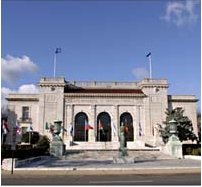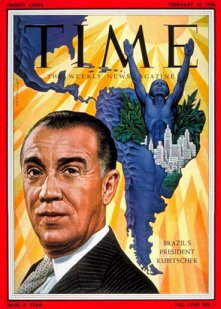|
Charter of Punta del Este - August 17, 196119
Establishing an Alliance for Progress Within the
Framework of Operation Pan America
Title I. Objective of
the Alliance for Progress
It is the purpose of
the Alliance for Progress to enlist the full energies of
the people and governments of the American republics in
a great cooperative effort to accelerate the economic
and social development of the participating countries of
Latin America, so that they may achieve maximum levels
of well-being, with equal opportunities for all, in
democratic societies adapted to their own needs and
desires.
1. To
achieve in the participating Latin American countries a
substantial and sustained growth of per capita income at
a rate designed to attain, at the earliest possible
date, levels of income capable of assuring
self-sustaining development, and sufficient to make
Latin American income levels constantly larger in
relation to the levels of the more industrialized
nations.
Title II. Economic and
Social Development
Chapter I. Basic
Requirements for Economic and Social Development
The American Republics
recognize that to achieve the foregoing goals it will be
necessary:
...
4. That the Latin
American countries obtain sufficient external financial
assistance, a substantial portion of which should be
extended on flexible conditions with respect to periods
and terms of repayment and forms of utilization, in
order to supplement domestic capital formation and
reinforce their import capacity...; and that, in support
of well-conceived programs, which include the necessary
structural reforms and measures for the mobilization of
internal resources, a supply of capital from all
external sources during the coming 10 years of at least
20 billion dollars be made available to the Latin
American countries, with priority to the relatively less
developed countries. The greater part of this sum should
be in public funds.
5. That institutions in
both the public and private sectors, including labor
organizations, cooperatives, and commercial, industrial,
and financial institutions, be strengthened and improved
for the increasing and effective use of domestic
resources, and that the social reforms necessary to
permit a fair distribution of the fruits of economic and
social progress be carried out.
Chapter II. National
Development Programs
...
2. National development
programs should incorporate self-help efforts directed
to:
a. Improvement of human
resources and widening of opportunities by raising
general standards of education and health; improving and
extending technical education and professional training
with emphasis on science and technology; providing
adequate remuneration for work performed, encouraging
the talents of managers, entrepreneurs, and wage
earners; providing more productive employment for
underemployed manpower; establishing effective systems
of labor relations, and procedures for consultation and
collaboration among public authorities, employer
associations, and labor organizations; promoting the
establishment and expansion of local institutions for
basic and applied research; and improving the standards
of public administration.
b. Wider development
and more efficient use of natural resources, especially
those which are now idle or under-utilized, including
measures for the processing of raw materials.
c. The strengthening of
the agricultural base, progressively, extending the
benefits of the land to those who work it, and ensuring
in countries with Indian populations the integration of
these populations into the economic, social, and
cultural processes of modern life. To carry out these
aims, measures should be adopted, among others, to
establish or improve, as the case may be, the following
services: extension, credit, technical assistance,
agricultural research and mechanization; health and
education; storage and distribution; cooperatives and
farmers' associations; and community development...
Chapter IV. External
Assistance in Support of National Development Programs
1. The economic and
social development of Latin America will require a large
amount of additional public and private financial
assistance on the part of capital-exporting countries,
including the members of the Development Assistance
Group and international lending agencies. The
measures provided for in the Act of Bogota and the new
measures provided for in this Charter, are designed to
create a framework within which such additional
assistance can be provided and effectively utilized.
Chapter V.
Organization and Procedures
1. In order to provide
technical assistance for the formulation of development
programs, as may be requested by participating nations,
the Organization of American States, the Economic
Commission for Latin America, and the Inter-American
Development Bank will continue and strengthen their
agreements for coordination in this field in order to
have available a group of programming experts whose
service can be used to facilitate the implementation of
this Charter. The participating countries will also seek
an intensification of technical assistance from the
specialized agencies of the United Nations for the same
purpose.
2. The
Inter-American Economic and Social Council, on the joint
nomination of the Secretary General of the Organization
of American States, the President of the Inter-American
Development Bank, and the Executive Secretary of the
United Nations Economic Commission for Latin America,
will appoint a panel of nine high-level experts,
exclusively on the basis of their experience, technical
ability, and competence in the various aspects of
economic and social development. The experts may be
of any nationality, though if of Latin American origin
an appropriate geographical distribution will be sought.
They will be attached to the Inter-American Economic and
Social Council, but will nevertheless enjoy complete
autonomy in the performance of their duties. They may
not hold any other remunerative position. The
appointment of these experts will be for a period of
three years, and may be renewed.
Title III.
Economic Integration of Latin America
6. In the application
of resources under
the Alliance for Progress, special attention
should be given not only to investments for
multinational projects that will contribute to
strengthening the integration process in all its
aspects, but also to the necessary financing of
industrial production, and to the growing expansion
of trade in industrial products within Latin
America.
7. In order to
facilitate the participation of countries at a
relatively lower stage of economic development in
multinational Latin American economic cooperation
programs, and in order to promote the balanced and
harmonious development of the Latin American
integration process, special attention should be
given to the needs of these countries in the
administration of financial resources provided under
the Alliance for Progress, particularly in
connection with infrastructure programs and the
promotion of new lines of production.
8. The economic
integration process implies a need for additional
investment in various fields of economic activity and
funds provided under the Alliance for Progress should
cover these needs as well as those required for the
financing of national development programs.
11. The
promotion and coordination of
transportation and communications systems is an
effective way to accelerate the integration process.
In order to counteract abusive practices in relation to
freight rates and tariffs, it is advisable to encourage
the establishment of multinational transport and
communication enterprises in the Latin American
countries, or to find other appropriate solutions.
The
original texts shall be
deposited in the archives of the
Pan American Union,
through the Secretary General of the Special Meeting, in
order that certified copies may be sent to the
Governments of the Member States of the Organization of
American States. |


